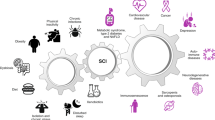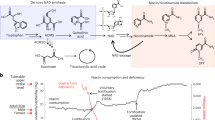Abstract
Objective:
Interleukin-18 (IL-18) is a cytokine with proinflammatory and proatherogenic properties, which might be associated with the development of insulin resistance. In contrast, adiponectin, a protein secreted by adipose tissue, might exert insulin-sensitizing and antiatherogenic effects. The aim of the present study was to analyze the association between serum IL-18 and adiponectin in lean and obese subjects, in relation to insulin resistance.
Design:
Cross-sectional study.
Subjects:
One hundred and thirty individuals, 62 lean (body mass index (BMI)<25 kg/m2, 30 men and 32 women) and 68 with overweight or obesity (BMI>25 kg/m2, 24 men and 44 women), with normal glucose tolerance and without concomitant diseases.
Measurements:
Oral glucose tolerance test, euglycemic hyperinsulinemic clamp, serum concentrations of IL-18, IL-6, soluble tumor necrosis factor-α receptors and adiponectin.
Results:
Obese subjects had lower insulin sensitivity (M value, P=0.00029) and serum adiponectin (P=0.01) and higher levels of serum IL-18 (P=0.00055). Circulating IL-18 was negatively related to adiponectin (r=−0.31, P=0.00027) and insulin sensitivity (r=−0.33, P=0.00012). Subgroup analysis revealed that these associations were present in the obese (adiponectin, r=−0.38, P=0.0014; M, r=−0.29, P=0.016), but not in lean individuals (r=−0.17, P=0.18 and r=−0.20, P=0.12, respectively). Association of IL-18 with adiponectin remained significant after adjustment for other estimated parameters, including insulin sensitivity. Also, relationship between IL-18 and insulin sensitivity was independent of other estimated parameters.
Conclusion:
Serum IL-18 is inversely related to serum adiponectin, independently of insulin resistance. The relationships of IL-18 with adiponectin and insulin sensitivity are influenced by the presence of overweight/obesity.
This is a preview of subscription content, access via your institution
Access options
Subscribe to this journal
Receive 12 print issues and online access
$259.00 per year
only $21.58 per issue
Buy this article
- Purchase on Springer Link
- Instant access to full article PDF
Prices may be subject to local taxes which are calculated during checkout

Similar content being viewed by others
References
Festa A, D'Agostino Jr R, Howard G, Mykkanen L, Tracy RP, Haffner SM . Chronic subclinical inflammation as part of the insulin resistance syndrome: the Insulin Resistance Atherosclerosis Study (IRAS). Circulation 2000; 102: 42–47.
Fernandez-Real JM, Ricart W . Insulin resistance and chronic cardiovascular inflammatory syndrome. Endocr Rev 2003; 24: 278–301.
Blankenberg S, Luc G, Ducimetiere P, Arveiler D, Ferrieres J, Amouyel P et al. Interleukin-18 and the risk of coronary heart disease in European men. The Prospective Epidemiological Study of Myocardial Infarction (PRIME). Circulation 2003; 108: 2453–2459.
Blankenberg S, Tiret L, Bickel C, Peetz D, Cambien F, Meyer J et al. Interleukin-18 is a strong predictor of cardiovascular death in stable and unstable angina. Circulation 2002; 106: 24–30.
Skurk T, Kolb H, Muller-Scholze S, Rohrig K, Hauner H, Herder C . The proatherogenic cytokine interleukin-18 is secreted by human adipocytes. Eur J Endocrinol 2005; 152: 863–868.
Wood IS, Wang B, Jenkins JR, Trayhurn P . The pro-inflammatory cytokine IL-18 is expressed in human adipose tissue and strongly upregulated by TNFalpha in human adipocytes. Biochem Biophys Res Commun 2005; 337: 422–429.
Esposito K, Pontillo A, Ciotola M, Di Palo C, Grella E, Nicoletti G et al. Weight loss reduces interleukin-18 levels in obese women. J Clin Endocrinol Metab 2002; 87: 3864–3866.
Escobar-Morreale HF, Botella-Carretero JI, Villuendas G, Sancho J, San Milan JL . Serum interleukin-18 concentrations are increased in the polycystic ovary syndrome: relationship to insulin resistance and to obesity. J Clin Endocrinol Metab 2004; 89: 806–811.
Hung J, McQuillan BM, Chapman CM, Thompson PL, Beilby JP . Elevated interleukin-18 levels are associated with the metabolic syndrome independent of obesity and insulin resistance. Arterioscler Thromb Vasc Biol 2005; 25: 1268–1273.
Esposito K, Nappo F, Giugliano F, Di Palo C, Ciotola M, Barbieri M et al. Cytokine milieu tends towards inflammation in type 2 diabetes. Diabetes Care 2003; 26: 1647.
Esposito K, Nappo F, Giugliano F, Di Palo C, Ciotola M, Barbieri M et al. Meal modulation of circulating interleukin 18 and adiponectin concentrations in healthy subjects and in patients with type 2 diabetes mellitus. Am J Clin Nutr 2003; 78: 1135–1140.
Aso Y, Okumura K, Takebayashi K, Wakabayashi S, Inukai T . Relationships of plasma interleukin-18 concentrations to hyperhomocysteinemia and carotid intimal–media wall thickness in patients with type 2 diabetes. Diabetes Care 2003; 26: 2622–2627.
Thorand B, Kolb H, Baumert J, Koenig W, Chambless L, Meisinger C et al. Elevated levels of interleukin-18 predict the development of type 2 diabetes: results from the MONICA/KORA Augsburg study, 1984–2002. Diabetes 2005; 54: 2932–2938.
Bosch M, Lopez-Bermejo A, Vendrell J, Musri M, Ricart W, Fernandez-Real JM . Circulating IL-18 concentration is associated with insulin sensitivity and glucose tolerance through increased fat-free mass. Diabetologia 2005; 48: 1841–1843.
Fischer CP, Perstrup LB, Berntsen A, Eskildesn P, Pedersen BK . Elevated plasma interleukin-18 is a marker of insulin-resistance in type 2 diabetic and non-diabetic humans. Clin Immunol 2005; 117: 152–160.
Yamauchi T, Kamon J, Waki H, Terauchi Y, Kubota N, Hara K et al. The fat-derived hormone adiponectin reverses insulin resistance associated with both lipoatrophy and obesity. Nat Med 2001; 7: 941–946.
Ouchi N, Kihara S, Arita Y, Nishida M, Matsuyama A, Okamoto Y et al. Adipocyte-derived plasma protein, adiponectin, suppresses lipid accumulation and class A scavenger receptor expression in human monocyte-derived macrophages. Circulation 2001; 103: 1057–1063.
Weyer C, Funahashi T, Tanaka S, Hotta K, Matsuzawa Y, Pratley RE et al. Hypoadiponectinemia in obesity and type 2 diabetes: close association with insulin resistance and hyperinsulinemia. J Clin Endocrinol Metab 2001; 86: 1930–1935.
Kowalska I, Straczkowski M, Nikolajuk A, Krukowska A, Kinalska I, Gorska M . Plasma adiponectin concentration and TNF-α system activity in lean non-diabetic offspring of type 2 diabetic subjects. Eur J Endocrinol 2006; 154: 319–324.
DeFronzo RA, Tobin JD, Andres R . Glucose clamp technique: a method for quantifying insulin secretion and resistance. Am J Physiol 1979; 237: E214–E223.
Esposito K, Pontillo A, Di Palo C, Giugliano G, Masella M, Marfella R et al. Effect of weight loss and lifestyle changes on vascular inflammatory markers in obese women: a randomized trial. JAMA 2003; 289: 1799–1804.
Lindegaard B, Hansen AB, Gerstoft J, Pedersen BK . High plasma level of interleukin-18 in HIV-infected subjects with lipodystrophy. J Acquir Immune Defic Syndr 2004; 36: 588–593.
Acknowledgements
This study was supported by the Grant 3 P05A 002 25 from the Polish State Committee for Scientific Research and by the Grant 3-50692 from the Medical University of Bialystok.
Author information
Authors and Affiliations
Corresponding author
Rights and permissions
About this article
Cite this article
Straczkowski, M., Kowalska, I., Nikolajuk, A. et al. Increased serum interleukin-18 concentration is associated with hypoadiponectinemia in obesity, independently of insulin resistance. Int J Obes 31, 221–225 (2007). https://doi.org/10.1038/sj.ijo.0803421
Received:
Revised:
Accepted:
Published:
Issue Date:
DOI: https://doi.org/10.1038/sj.ijo.0803421
Keywords
This article is cited by
-
Muscle ceramide content is similar after 3 weeks’ consumption of fat or carbohydrate diet in a crossover design in patients with type 2 diabetes
European Journal of Applied Physiology (2012)
-
Regulation of Bone Mineral Density in Morbidly Obese Women: A Cross-sectional Study in Two Cohorts Before and After Bypass Surgery
Obesity Surgery (2009)
-
Circulating IL-18 and the risk of type 2 diabetes in women
Diabetologia (2009)



